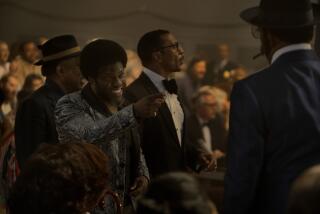MOVIE REVIEW : âJohnny Handsomeâ Gets a Second Chance at Life in Big City
âJohnny Handsomeâ (citywide)--the new Walter Hill thriller about a deformed sociopath and his second chance at life--has a temperament like a three-time loser.
This action movie works fine in its hard-bitten, gutty first half, when itâs locked up in the jail or the hospital. But when itâs sprung into the open air in the payoff sections, âHandsomeâ canât handle freedom. It gets sucked back into the bad habits of most â80s Hollywood revenge thrillers. It wanders, falls into memory lapses and jumps in logic. To cover up, it starts screaming and picking fights. Finally, it blows its cool completely, hurling around crashed cars and gunfights, wild profanity and empty sleaze.
By the climax--a gunfight in a graveyard with a hostage and a lot of yelling--we may have forgotten how good âJohnnyâ was in the beginning: in the scenes with sensitive doctor Forest Whitaker and cynical cop Morgan Freeman, or when Mickey Rourke sees his new face for the first time and the tears streamed down it. Isnât there some kind of support group for movies like this? Car-Chase Anonymous?
Rourke is the movieâs Johnny Handsome, another of his recent gallery of gamy outsiders. And if parts of the role seem ripe for parody--the Elephant Man Without a Cause--he still manages to connect with it. A petty street criminal with a heroic soul underneath a misshapen face, Johnny has one friend--a fatherly heist man played with bruised heart and wounded smile by Scott Wilson----and two deadly enemies: wild, evil street scum played by Lance Henriksen and Ellen Barkin.
After these depraved enemies kill his friend during a torpedoed jewelry heist, Johnny takes the fall and gets his chance. A warmhearted doctor (Whitaker) offers to change him completely: remove his harelip, get therapy for his cleft palate and operate away the ridges of facial bone, the frontal encephlocele that gave him his nickname.
Most actors give you the impression theyâre living out other peopleâs fantasies; Mickey Rourke is one of a handful who always seem to be living out his own. That may be why heâs a cult star in Europe, where heâs seen as part of a direct line from Dyonysian â50s hoods like Brando and Dean. And, here, when he first gets his new face, all of his usual wary, evasive, pulled-in mannerisms work for the character. Rourkeâs Johnny seems to be discovering the world in a new way, smiling to himself at peopleâs changed reactions, though later he gets too comfortable, goes from bruised outsider to swaggering stud too easily.
The doctor believes heâs giving Johnny a new life. The cop on the case, Drones (Freeman), seems convinced that heâs a recidivist, a backslider. Torn between these two, the bleeding heart and the misanthrope, the movie gets its best moments. Whitaker has a wonderful, self-righteous touchiness, and Freeman gives his part that unshakable concentration and cold, teasing malice that made his Fast Black in âStreet Smartâ one of the great movie villains of the â80s.
Hill must realize that he has pure gold whenever Rourke, Whitaker and Freeman are together in any combination. Heâs obviously cast the last two against type, even against the script: A. Z. Drones and Steven Resher are names that suggest white Southerners or urban Jews, not blacks. Making both authority figures black--and making Johnny an outcast because of his physical characteristics--temporarily gives âHandsomeâ an ironic edge, which it then loses completely in the second half, when the sense of evil gets halting, corny, boobish.
Walter Hillâs best â70s work had real nerve and gristle, an interesting balance between a love of movie machismo and a tendency to subvert it, but he also had a tendency to schematize everything, reduce his stories to fable and formula. Here, perhaps because heâs adapting a novel (by John Godey) and working with a different writer--Ken Friedman, whoâs written several Jonathan Kaplan films, including âHeart Like a Wheelâ--thereâs initially more attention to character. All these people live on the cusp. Even the heroine, Elizabeth McGovern as a sweet secretary named Donna, isnât part of conventional society. At best, sheâs a slummer.
Film noir is an overused term but, at the beginning, thatâs what Hill, Friedman and the cast and crew reach for and get. âHandsome,â shot by Matthew Leonetti, has a hard, cool veneer. The rhythm of the scenes, the smack and drive of the editing--separated by the credits, and later by fadeouts--suggests a dangerous lassitude, chopped up ruthlessly.
Hill sticks to that deliberate pace at first, but it begins to go awry in the gauzily romantic scenes with Johnny and Donna, and it vanishes in the lower-depths bouts with Barkinâs sneering slut, Sunny, and Henriksenâs junkyard-dog-mean Rafe: two characters so unrelievedly vicious that they become comic. Barkin obviously likes to play bad girls, but here she indulges herself. Her performance doesnât have the perfectly judged knife-edge of provocation, sexuality and terror she puts into âSea of Love.â
Itâs a shame, because when you watch the the Johnny-Sunny scenes, you realize that if Sunny played them sweeter, showed a âniceâ side beneath the icy venom, sheâd immediately become much scarier. But that kind of ambivalence is probably beyond âJohnny Handsomeâ (MPAA-rated R for sex, language and violence). This movie can spot the handsome face that lies beneath an ugly exterior, but it seems to get fooled by the rot that sometimes lurks beneath the sweet and the safe, the formula and the sure-fire.
More to Read
Only good movies
Get the Indie Focus newsletter, Mark Olsen's weekly guide to the world of cinema.
You may occasionally receive promotional content from the Los Angeles Times.










